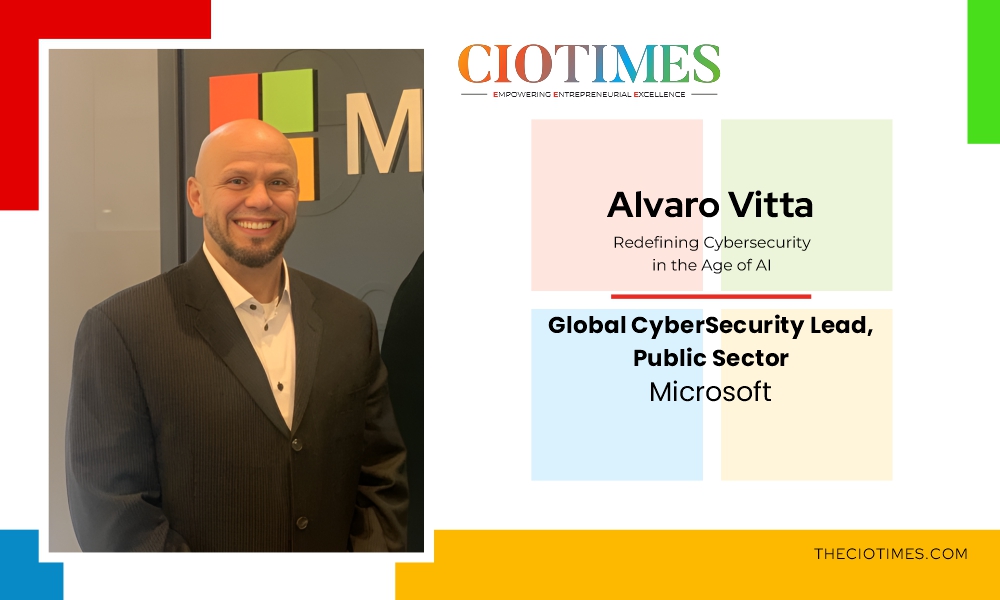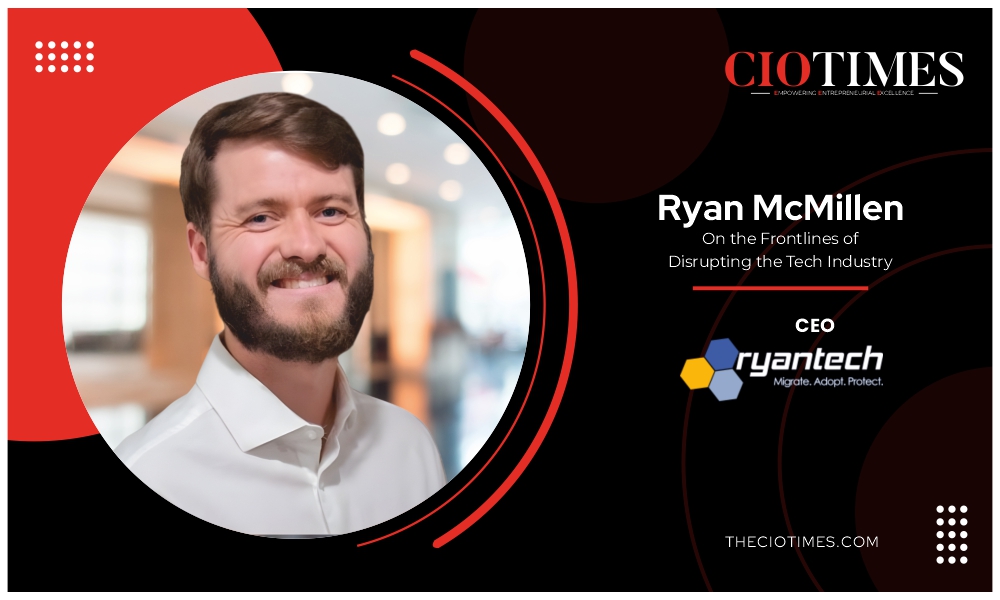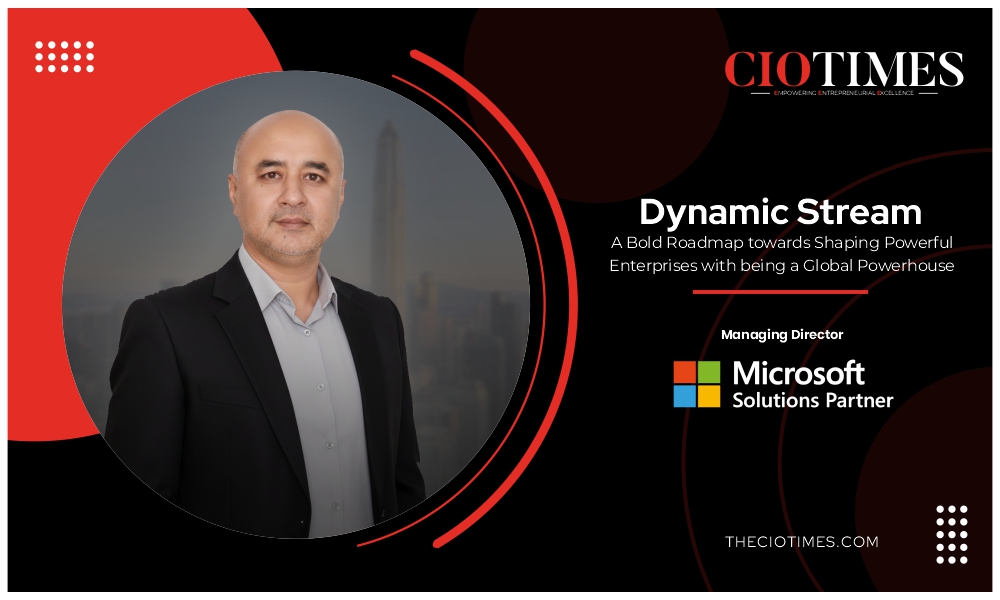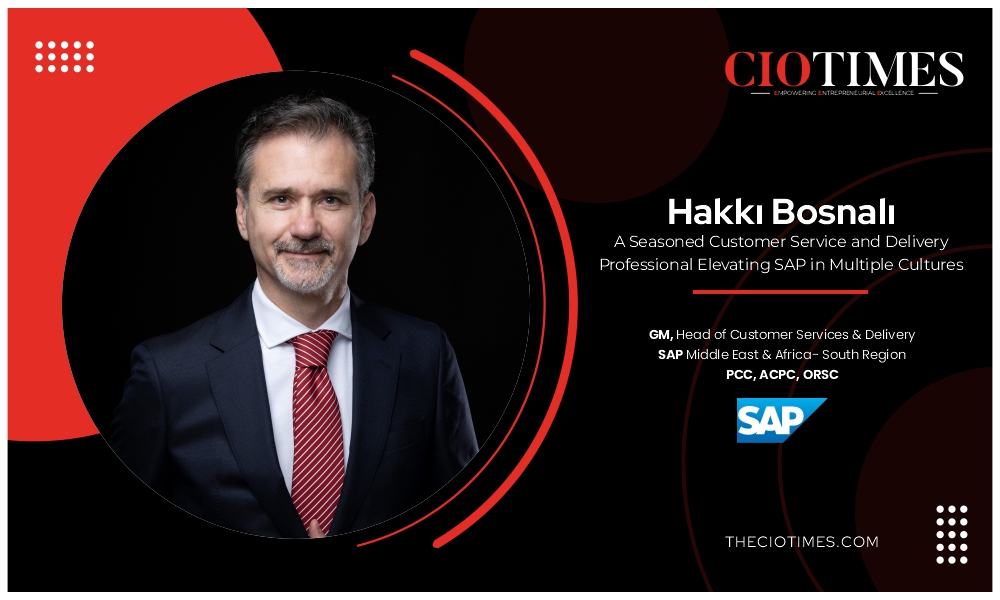Imagine a world where cyber threats are as tangible as natural disasters, reshaping economies, destabilizing governments, and intruding on personal lives. In today’s digital age, this isn’t just a distant possibility, but reality.
Cyber threats have grown from isolated attacks to coordinated strikes capable of penetrating national infrastructures and influencing global stability. The stakes have never been higher and neither has the need for leaders who can turn the tide in the cybersecurity space.
Enter Alvaro Vitta, a figure at the forefront of this high-stakes battlefield. Where others see risk, Alvaro sees potential—to innovate, collaborate, and outpace adversaries. As Microsoft’s Cybersecurity Lead for the Worldwide Public Sector, Alvaro isn’t just responding to the cybersecurity crisis; he’s reimagining the approach entirely. His strategy combines generative AI, cloud resilience, and a deep-rooted commitment to building a unified cyber defense system capable of handling the threats of both today and tomorrow.
Alvaro’s journey with Microsoft has been one of relentless advancements, as he leads a global initiative aimed at transforming public sector cybersecurity. Through his leadership, Microsoft’s ATLAS program and AI-driven innovations are helping governments worldwide secure their digital infrastructures and defend against the sophisticated challenges of the cyber world. And for Alvaro, it’s more than just a role, it’s a mission to shape a safer digital future.
The ATLAS Program: Shaping the Future of Cyber Defense with AI
Alvaro’s work on the ATLAS program exemplifies his forward-thinking approach. ATLAS serves as a flagship initiative under Alvaro’s leadership, aimed at modernizing security operations for local, regional, and national public sector organizations. The program is built upon four core pillars: Gen-AI Cyber Skilling, Co-Design, Co-Innovation, and a Collective Cyber Defense Plan.
Through Gen-AI Cyber Skilling, Alvaro has championed the importance of equipping cybersecurity teams with the necessary skills to operationalize generative AI in public sector environments. The skilling framework within ATLAS ensures that teams can seamlessly integrate Gen-AI capabilities into their workflows, creating a foundation that scales in pace with emerging threats.
Another critical component, Co-Design, reflects Alvaro’s commitment to collaboration. By working directly with public sector agencies, ATLAS creates customized solutions that address regulatory requirements and regional cybersecurity legislation. This approach ensures that each solution is tailored, not just to defend, but to thrive in the unique security landscape of each region.
Alvaro’s dedication to fostering innovation is also evident in the Co-Innovation pillar. Here, public sector organizations and Microsoft jointly develop new capabilities to meet specific use cases, effectively creating a proactive and adaptable cyber defense system.
Lastly, the Collective Cyber Defense Plan represents Alvaro’s vision of a unified cybersecurity ecosystem. By implementing a Gen-AI Cyber Defense platform that connects public sector entities across regions, Alvaro is laying the groundwork for a national network where cybersecurity threats and intelligence can be shared efficiently, bolstering the nation’s resilience against complex attacks.
Bridging the Cybersecurity Talent Gap
In the cybersecurity industry, the shortage of skilled professionals is a persistent challenge. Alvaro has not only recognized this issue but has positioned generative AI as a solution to multiply the capacity of existing cybersecurity teams.
“We face a rapidly growing shortage of cybersecurity talent, but by strategically leveraging generative AI, we can alleviate some of this burden,” Alvaro explains. Under his guidance, ATLAS integrates a Cyber Skilling framework designed to train and elevate cybersecurity professionals within the public sector. This framework is more than just training; it is a practical solution that enables public sector organizations to quickly scale their teams and maintain effective defenses even amid talent shortages.
Additionally, through the ATLAS program, Alvaro has developed tools that use automation to handle routine tasks, freeing cybersecurity personnel to focus on addressing new and evolving threats. By taking this approach, Alvaro not only strengthens the immediate capabilities of security teams but also contributes to the long-term sustainability of public sector cybersecurity.
Fostering a Collaborative Cyber Ecosystem
One of Alvaro’s most distinctive contributions is his emphasis on collaboration, not only within organizations but across national boundaries. Under his vision, the ATLAS program aims to create a ‘cyber defense connective tissue’ that allows public sector agencies to share threat intelligence and insights in real time.
In Alvaro’s view, collaboration is the foundation of modern cybersecurity. By encouraging public sector organizations to share information and best practices, he is helping to create a collective intelligence that is resilient, adaptive, and responsive. This collaborative ecosystem represents a shift from isolated, siloed approaches to one that unifies cybersecurity efforts across regions and industries.
Alvaro envisions a network where national and regional agencies can tap into a shared pool of knowledge and resources, enabling them to respond to threats more swiftly and with greater precision. In his words, “Collaboration is no longer an option; it’s a necessity. Cyber threats are evolving too quickly, and we must evolve with them, together.”
Microsoft’s Commitment to Cybersecurity
Alvaro’s work is deeply intertwined with Microsoft’s broader mission in cybersecurity, empowering governments worldwide to achieve secure digital environments for their citizens. According to recent statistics, government agencies faced an astonishing 150% increase in cyberattacks, with 53% of these attacks targeting critical infrastructure. As Alvaro underscores, this trend demands a comprehensive response, one that Microsoft has committed to in both resources and innovation.
To address these pressing concerns, Microsoft launched the Secure Future Initiative (SFI) last November, an all-encompassing program aimed at elevating cybersecurity protections across the company’s products. Alvaro’s leadership has helped integrate the insights and recommendations from key industry findings, such as the Department of Homeland Security’s Cyber Safety Review Board. This integration ensures that Microsoft’s approach remains robust and adaptable, prioritizing security across all areas of public sector engagement.
A Vision Beyond
Alvaro’s insights extend beyond his work at Microsoft, as seen in his own blogs that delve into the nuances of modern cybersecurity. In his blog titled “Defend against cyber threats with AI solutions from Microsoft”, Alvaro discusses the importance of adopting a National AI Cyber Shield System powered by tools like Microsoft Copilot for Security.
As he elaborates in the blog, this system unifies various tools into a seamless platform, combining Security Information, Event Management (SIEM), and Extended Detection and Response (XDR) to provide a holistic view of an organization’s security posture.
Another blog, “How governments are leveling the cybersecurity playing field with cloud and AI”, provides Alvaro’s perspective on the digital infrastructure needed for modern public sector security. He notes, “Technology is more than a budget line; it’s the backbone of national resilience.” His blogs advocate for governments to adopt cloud platforms with AI-driven capabilities, ensuring that cybersecurity is proactive and integrated across all digital ecosystems.
New Challenges, New Solutions
Microsoft has consistently adapted to the rapid evolution of cyber threats, many of which are fueled by geopolitical tensions and the misuse of AI by malicious actors. As governments and public sector organizations become more reliant on digital ecosystems, the risks escalate, with a reported 85% increase in AI-driven cyberattacks aimed at governmental agencies alone.
Alvaro’s approach to these emerging threats involves leveraging the advantages of Microsoft’s Gen-AI capabilities to outpace attackers. Through advanced threat intelligence, predictive modeling, and automated response mechanisms, Microsoft’s cybersecurity suite under Alvaro’s guidance is designed not just to react but to preempt. “We’re in a constant race,” Alvaro asserts, “and the only way to stay ahead is by anticipating the attacker’s moves.”
By integrating AI into every layer of public sector cybersecurity, Alvaro ensures that his team at Microsoft isn’t merely following the status quo. Instead, they’re setting new standards by transforming traditional security operations into proactive, agile systems that continuously learn and evolve. This dynamic approach allows public sector organizations to keep pace with rapid technological advancements, maintaining an edge even in the face of new AI-enabled threats.
Strengthening Resilience with the Secure Future Initiative (SFI)
A testament to Microsoft’s unwavering commitment to public sector security is the Secure Future Initiative (SFI). Launched to fortify cybersecurity protections, SFI extends across all Microsoft products and services, creating a seamless shield that fortifies each digital interaction. This initiative integrates real-time threat intelligence, streamlined by recent industry findings from the Cyber Safety Review Board and other key advisory bodies, to stay ahead of adversaries in an evolving threat landscape.
At the heart of SFI’s mission is the principle of adaptability. By constantly updating and refining its cybersecurity measures, Microsoft addresses not only the challenges of today but anticipates those on the horizon. To hold itself accountable, Microsoft has embedded SFI’s goals into its leadership structure, making cybersecurity milestones a key metric for its Senior Leadership Team. Alvaro’s contributions towards SFI reflect his belief in constant vigilance, collaboration, and commitment, echoing his mission to make security “priority one” at Microsoft.
The impact of SFI goes beyond technical advancements. It represents a cultural shift within Microsoft, where cybersecurity isn’t just a responsibility but a driving force behind each innovation. “It’s about more than tools,” Alvaro states. “It’s about establishing a culture of trust and resilience that our customers and partners can depend on.”
Modernizing Public Sector Cybersecurity
Alvaro underscores the importance of abandoning legacy infrastructure and embracing cloud-based solutions that offer scalability and adaptive security features. “Technology should not be seen as a budget item but as a vital asset for national resilience,” he asserts, capturing the essence of a mindset change necessary for public sector evolution.
Alvaro’s call for modernization is clear: public sector entities must migrate from outdated, siloed systems to platforms that allow for real-time data analysis and threat detection. Alvaro envisions a future where governments operate on unified platforms that enable seamless communication across agencies and national borders, creating a cybersecurity network that is agile, cohesive, and capable of rapid adaptation.
He explains that governments that make the leap to cloud-based, AI-powered systems are better prepared to counter threats and manage crises. In Alvaro’s view, this shift is not merely beneficial but essential to navigating the evolving cyber threat landscape effectively.
Transforming Cybersecurity Leadership
Alvaro believes that true resilience in cybersecurity comes from a balance of technical acumen and the empowerment of teams who manage security on the frontlines. His approach emphasizes education and empowerment.
His work with Microsoft’s Gen-AI Cyber Skilling framework underscores his commitment to building a capable cybersecurity workforce. By focusing on skills development, Alvaro addresses a critical aspect of public sector cybersecurity—the people who operate within it. Under his leadership, the Gen-AI Cyber Skilling framework equips cybersecurity teams with the tools, knowledge, and AI-powered resources needed to maintain an active, adaptive defense.
Alvaro also emphasizes the importance of collaboration within cybersecurity. By promoting a shared cybersecurity framework that connects agencies, he encourages a sense of community within the cyber defense ecosystem. As Alvaro puts it, “We can’t afford to work in silos. In cybersecurity, every insight, every shared piece of information adds a layer of protection.” His leadership encourages an atmosphere where agencies work together, not only sharing best practices but also developing collective solutions that are informed by a broader view of the threat landscape.
Preparing for Tomorrow’s Challenges
Looking toward the future, Alvaro remains focused on the evolving nature of cybersecurity threats and the need for continuous innovation. He recognizes that the landscape is becoming increasingly complex, driven by new technologies, adversaries, and tactics. To remain resilient, Alvaro believes public sector organizations must adopt a proactive approach driven by innovation.
This perspective is reflected in his focus on automation and AI-driven preventive measures. Alvaro’s strategy goes beyond detection, steering public sector cybersecurity towards a preventive stance that relies on automation to neutralize known attack patterns. This approach frees up critical cybersecurity resources, allowing experts to focus on unknown threats, a model Alvaro sees as vital for handling the unpredictable future of cybersecurity.
As cyber threats grow more sophisticated, Alvaro envisions a future where the National AI Cyber Shield evolves in tandem with emerging technologies, adapting to novel threat vectors and expanding to offer even greater protection.
Alvaro’s vision aligns with Microsoft’s continuous investment in cybersecurity, particularly the company’s commitment of over USD 20 billion towards security research, data protection, and real-time threat management. His leadership in these initiatives exemplifies Alvaro’s dedication to ensuring that public sector cybersecurity is not just reactive but anticipatory, with the agility to tackle tomorrow’s challenges head-on.
A Legacy of Innovation
Alvaro Vitta’s journey has left an indelible mark on the cybersecurity landscape. His innovative programs, forward-thinking vision, and commitment to collaboration have fundamentally transformed cybersecurity for the public sector, making it more resilient, adaptive, and future-focused. Through initiatives like ATLAS and SFI, he has laid a foundation that will shape cybersecurity strategies for years to come.
In his journey, Alvaro has shown that true leadership in cybersecurity goes beyond technical achievements. It also involves fostering a culture of collaboration, resilience, and shared responsibility. By championing the adoption of generative AI and cloud solutions, he has not only bridged the gap in cyber talent but has also built a legacy of resilience and empowerment.
As Alvaro continues to lead and innovate, his influence reaches far beyond the boundaries of Microsoft, inspiring a new generation of cybersecurity leaders to look beyond traditional defense strategies and embrace a future where AI, collaboration, and continuous learning drive meaningful change. In an industry defined by rapid shifts and relentless challenges, Alvaro Vitta stands as a visionary force, guiding public sector cybersecurity into a new era of strength, unity, and proactive defense.
Don’t miss this – Digital Magazine




